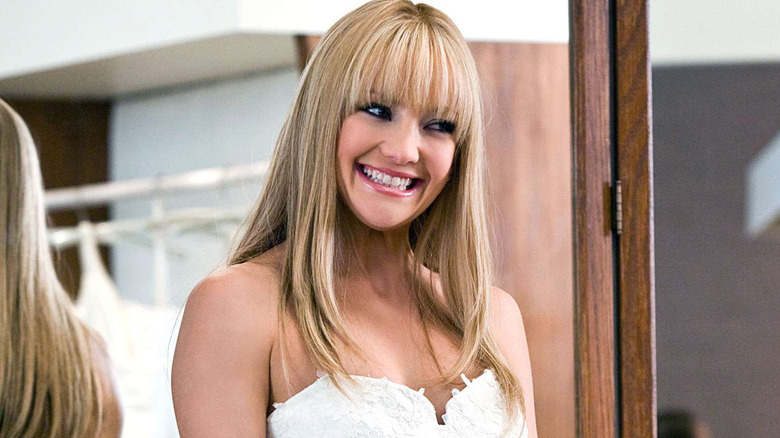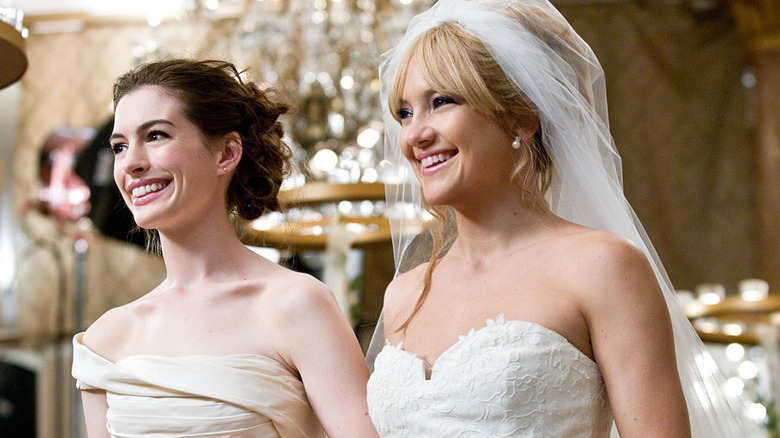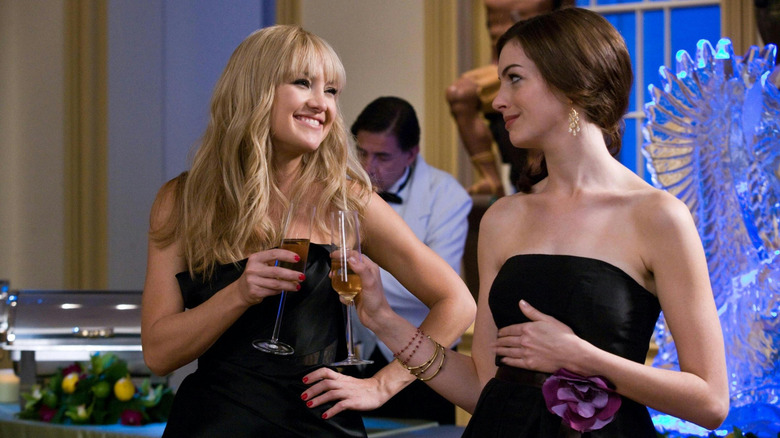A Forgotten Kate Hudson Comedy Is Blowing Up On Netflix
Kate Hudson has been a Hollywood fixture for decades at this point. The daughter of Goldie Hawn and stepdaughter of Kurt Russell, Hudson first earned worldwide fame and acclaim when she played Penny Lane in 2000's "Almost Famous," a role that earned her an Oscar nod, and she's been an industry staple ever since. Still, you might have forgotten about one of her frothier romantic comedies, and as it happens, it's streaming on Netflix and crushing the charts on said streamer (per FlixPatrol).
After she headlined other rom-coms like "How to Lose a Guy in 10 Days" in 2003 and "You, Me, and Dupree" in 2006, Hudson teamed up with Anne Hathaway for the film "Bride Wars" in 2009. Directed by Gary Winick (who's known for other rom-coms of the era, including "13 Going on 30"), "Bride Wars" was, unbelievably, written by Greg DePaul, Casey Wilson, and June Diane Raphael; I say "unbelievably" here because, dePaul aside, Wilson and Raphael are two of the funniest people around (in my humble opinion). I also say "unbelievably" because "Bride Wars," a movie where Hudson and Hathaway's characters experience a full breakdown of their friendship over something as frankly superficial as a wedding, leans into some of the worst stereotypes about women and how they act when they become "brides-to-be." Allow me to explain.
How exactly does the titular bridal war in Bride Wars play out?
The story of "Bride Wars" is pretty simple: Liv Lerner (Kate Hudson) and Emma Allan (Anne Hathaway), who have been best friends since childhood, have always both dreamed about getting married at the famous Plaza Hotel in New York City. When Liv and Emma end up getting engaged at the same time to their respective boyfriends, Daniel Williams (Steve Howey) and Fletcher Flemson (a pre-"Parks and Recreation" Chris Pratt), they meet with the Plaza's wedding coordinator Marion St. Claire (Candice Bergen) and learn there are two dates available in June. Unfortunately, a mistake is made during the booking process, and Emma and Liv both end up with weddings scheduled for June 6; by the time they realize this, the venue is fully booked, so no changes can be made.
This sets off that titular war, because the way Emma and Liv treat each other over this wedding date is horrific. Basically, both of them try to convince the other to cancel her wedding, but why they never even consider a double wedding with any seriousness is beyond me. They then play increasingly mean pranks — Emma sends Liv candy (so she'll gain weight and not fit into her wedding dress) and puts blue hair dye in her shampoo, while Liv spreads a mean rumor that Emma is pregnant — until they end up sharing the venue and having a full-out fistfight clad in wedding gowns. There's also (spoilers) a subplot involving Emma realizing she actually hates Fletcher and canceling her wedding, ensuring that Liv gets the Plaza wedding. Instead, Emma ends up with Liv's brother Nate (Bryan Greenberg), and at the end of the movie, she and Liv learn they're pregnant and have the same due date.
Honestly, Bride Wars leans into some of the all-time worst stereotypes about women (and their priorities)
I know that everything that follows this sentence is going to make me sound like a humongous grump, and honestly, I can live with that. With the utmost due respect to Casey Wilson and June Diane Raphael (two hysterically funny women whom I deeply respect), this movie is an absolute stinker. Right from the start, Liv and Emma fit into neat stereotypes — Liv is a bossy and successful overachiever who often runs roughshod over her friends and loved ones, while Emma is a meek, broke middle school teacher who gets pushed around by everyone, including both Liv and Fletcher. Once their weddings both end up scheduled for June 6, the two women essentially become sociopathic monsters, throwing away their decades-long friendship and well-being for ... what, exactly? A wedding that, I would guess, costs hundreds of thousands of dollars?
"Bride Wars" traffics in some of the most irritating stereotypes about womanhood, especially the one that all women focus on is their wedding, setting aside any other milestones they might reach in life or more, let's say, tangible accomplishments. Both Emma and Liv turn fully evil once they learn that they can't have weddings on the same day, at the same time, and at the same place, and it's so abrupt and weirdly handled by the film that it almost feels like they were possessed by rude aliens or both had aneurysms at the exact same second or something. Women contain multitudes, none of which are even remotely present in "Bride Wars." Instead, Emma and Liv's experiences are distilled down to one day and one event, rendering their relationships and shared friendship obsolete.
Anyway, "Bride Wars" is streaming on Netflix now.


